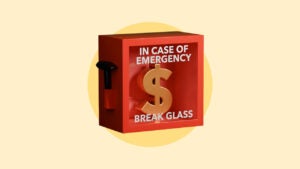What are instant loans? Everything you need to know




Key takeaways
- Instant loans are quick, but they often come with extremely high fees and predatory terms.
- Consider alternatives, like debt negotiation or a bad credit loan, before turning to instant options like payday loans.
- Review any loan contract carefully to ensure you understand the terms and that it complies with your state’s laws and regulations.
An instant loan can get you cash quickly — sometimes within the same day — even if you don’t have strong credit. However, the sky-high interest rates and sizable fees can make instant loans challenging to repay and may even trap you in a cycle of debt. A few extra dollars may not seem like much, but they can add up quickly and translate to a high APR.
These adverse effects can be even more detrimental for low-income borrowers. In the states that allow these types of loans, payday lenders extracted $2.4 billion in fees from low-income borrowers in 2022 alone, according to the Center for Responsible Lending. If you’re already struggling to keep up with bills, the high cost of an instant loan may lead to additional financial distress.
What is an instant loan?
An instant loan is a short-term loan for a small sum that comes with high interest rates and fees. Borrowers often turn to them when they need to cover an emergency expense, like a car repair or other unexpected bill, but have little or no savings.
Depending on state laws, these short-term loans are available in a few varieties: payday loans, pawn shop loans and car title loans.
- Payday loans: A payday loan doesn’t require collateral and may offer cash on the spot. You must repay the loan (plus high interest fees) by your next pay period, typically within two weeks. They’re a common instant loan option — 12 million Americans use them yearly, and many borrow more than one.
- Pawn shop loans: A pawn shop loan, or pawn loan, is a secured loan. The pawn shop holds an item you own as collateral for the loan. In exchange for the item, you receive a loan in a lesser amount than the collateral’s value. If you don’t return to repay the loan by the payment date, the pawn shop will claim ownership of the item and potentially sell it.
- Car title loan: Also known as a pink slip loan, this form of financing is secured by your vehicle’s title. You still get to drive your car, but you’ll need to repay the loan in full, including interest fees, by the due date. If you don’t repay it on time, the lender can repossess your car.
Fast approval and funding timelines can make instant loans attractive, but regardless of the type of instant loan you’re considering or what a lender calls it, an instant loan is a high-risk borrowing option. Consider all alternatives carefully first before turning to an instant loan.
Are instant loans a good idea?
In most situations, instant loans aren’t a good idea and should be avoided if possible. Along with steep costs, the short repayment period and potential damage to your credit can make them difficult to manage.
Steep borrowing costs
A typical payday loan APR (annual percentage rate) is 400 percent — and there are few new laws regulating the amount a lender can charge. This means if you need to borrow $400, you might pay an extra fee of $60 to get the funds you need today. The fee on its own may seem nominal, but borrowing costs can add up quickly if you’re unable to repay what’s owed on the due date.
Overdraft fees
Lenders generally require access to your bank account to initiate repayment when the loan becomes payable. If you don’t have enough money in your bank account, the lender will still try to transfer funds. This can lead to overdraft fees from your bank — and potentially a non-sufficient funds fee from your lender.
If a loan rollover or extension isn’t offered in your state, you’ll likely continue to incur penalties until your bank account balance is high enough to cover the full loan amount, increasing the total cost of borrowing and sinking you deeper in debt.
Short repayment periods
If you’re already facing financial hardship, it may be challenging to repay the loan and any applicable interest and fees within such a short timeframe. In fact, four out of five payday loan borrowers roll over or renew their loans within 14 days, according to the Consumer Financial Protection Bureau (CFPB).
Unfortunately, this option comes at a cost, and continuous rollovers or renewals could cause the fees to balloon. Using the earlier example, if the lender charges $60 per rollover and you extend the loan twice, the balance will increase to $520 in just one month. And qualifying for a debt consolidation loan to pay off your instant loans and prevent a buildup of fees can be difficult if your credit isn’t in good shape.
Potential credit damage
Payday loan default is unfortunately far from uncommon — one in five borrowers defaults on their payday loan, according to the CFPB. If your loan goes into default, the negative event will be reported to the credit bureaus and you’ll have to deal with debt collectors. Collection accounts can tank your credit score and linger on your credit reports for up to seven years.
Debt collectors can also sue you to recoup the outstanding funds. If the court rules in their favor, your wages might be garnished.
How do instant loans work?
The application process is the same for most instant loans: You submit an application and, if approved, sign a contract that states the cost and due date. APRs on these loans are incredibly high, sometimes going well into the triple digits. Fees vary by state, and each state has its own limits. The rates are high because lenders consider these to be high-risk loans.
- Submit an application. Payday loans don’t typically require a credit check, but the lender will require proof of income and a bank account. You can find both online and in-person lending options, depending on where you live.
- Give a postdated check or ACH authorization. If you apply for an instant loan online, your lender will likely require an ACH (Automated Clearing House) authorization from your bank account. Storefront lenders may require a postdated check with the loan’s due date and the amount you owe.
- Receive your loan funds. The lender will provide the loan amount, excluding fees, as a lump sum in cash. An online instant loan might be directly deposited into your account, if you’ve granted access.
- Repay the loan by the due date. The repayment term for a payday loan is about two weeks, or the date of your next paycheck. This also varies by lender and the details of the loan agreement. When it’s time to repay the loan, you’ll pay the loan amount and any relevant fees.
If you can’t repay the loan on time, some payday lenders offer a rollover option to delay repayment for another pay period. Not all states allow rollovers, and this option costs another fee. The CFPB found that some borrowers roll their loans over so many times that the cost of fees outweigh the original loan amount.
What are alternatives to instant loans?
In most cases, you should only use instant loans as a last resort because they generally come with high fees and rates. Before moving forward with one, seek out alternatives with lower borrowing costs than instant loans. That way, you can lower your chances of getting stuck in a debt cycle.
- Negotiate a payment plan: Contact your creditor or servicer to explain your financial situation and see if they offer reduced payment plans. This may not always be an option, but it won’t hurt to try to negotiate.
- Personal loan for bad credit: Although this option also comes with high interest rates, personal loans are still considerably less expensive. According to debt.org, payday loans have interest rates between 300 and 500 percent. For context, a bad credit personal loan may have an APR of 25 to 36 percent. Plus, most personal loans offer longer repayment periods, commonly one to seven years.
- Family and close friends: Ask trusted family members and close friends if they’re willing to give you a short-term loan. Make sure you’re both clear about interest and repayment expectations, and consider drafting a written agreement.
- Speak with a nonprofit credit counselor: To address the root causes of your debt and make long-term plans, discuss your options with a nonprofit credit counseling agency. Their services are typically free or low-cost, and they can help you with a debt management plan so you can be prepared for unexpected expenses.
- Credit card cash advance: These are expensive, but not nearly as expensive or risky as instant loans. A cash advance is a short-term loan borrowed against the credit line on an existing credit card. Rates are typically much higher than your card’s purchase APR, and you’ll also typically pay a cash advance fee of 3 to 5 percent of the transaction amount.
To avoid continued reliance on instant loans, create a budget that accounts for your income and expenses. Save up for large, planned expenses, and build an emergency fund for unexpected costs.
Bottom line
Instant loans aren’t the ideal go-to financing option to use when a big expense surprises you. Consider any alternatives before taking on the predatory fees of a payday loan.
If you believe an instant loan is really your only option, read your state’s regulations for payday lending. Some states impose maximum loan amounts, fee and rollover restrictions — as well as other requirements for payday lenders — to discourage predatory lending practices.
To learn more about the rules in your state, reach out to your state banking regulator or attorney general.
Why we ask for feedback Your feedback helps us improve our content and services. It takes less than a minute to complete.
Your responses are anonymous and will only be used for improving our website.
You may also like

Low-income loans: Personal loans for a tight budget

Best personal loans with no prepayment penalty

How to get an emergency loan in 5 simple steps

Pros and cons of fast business loans
